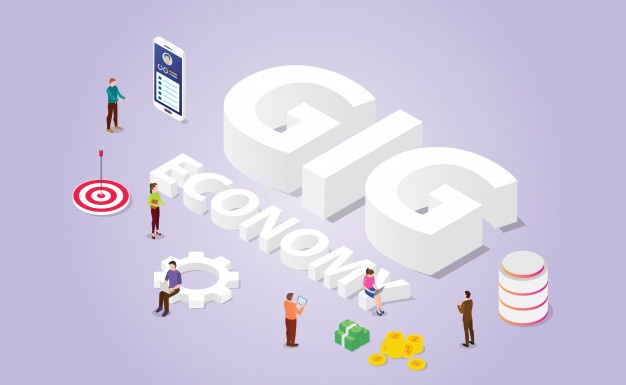
- November 22, 2021
- The gig economy
Gig economy can be defined as one in which the workforce contributing to it is predominantly contractual. Freelance work and work contracts, both short term and long ter. are the highlights of the gig situation. This concept is being adopted by companies increasingly all over the world. This is because of the advantages it offers for the employer and the employee.
The community of qualified personnel who prefer freelance work to permanent employment is increasing and companies find that the talent available in these professionals can be used to advantage.
According to published statistics by the Bureau of Labor Statistics, the gig workers in the United States comprised about 34% of the workforce in 2017 and this is expected to rise to 43% in 2020 and further increase in 2021. It is interesting to note that one in four of the freelance workers is Indian.
There seems to be an increasing trend
among young and highly qualified professionals to opt for contract employment because of the flexibility and independence it offers, apart from the freedom of choice. These considerations far outweigh the conventional ideas of job security and social service benefits that come along with regular employment. This has been recognised by corporates, whose attitude has changed drastically over the last few years. Organizations respect the fact that the modern professional values his time, his independence and his leisure time. For some of us who belong to a comparatively old school, this attitude may seem fraught with risk. We may even go to the extent of saying that these youngsters are being foolhardy without knowing the consequences of a bad economic turn. However, this attitude is passe, let us accept it.
Having said all this, businesses need to adjust to the new realities and chart out their roadmap and business operations accordingly. This needs a change of attitude that is not easy to come by since it needs a quantum change in outlook that many of us may not like. However, the sooner we adjust to the new situation, the better. Going by present indications, the changes we are seeing are irreversible.
Once we accept this, it becomes our duty to create an ecosystem that fosters growth of the gig professionals. This is essential to ensure that business doesn’t suffer because people, whether permanent employees or contractual, are an organization’s biggest assets. To nurture their growth, professionals have to be provided opportunities to learn and develop their skills and competencies like decision-making and risk taking. The Return on Investment on such initiatives is compatible to the efforts and cost. This becomes easier if and when we consider these gig workers as knowledge workers and business partners and treat them with respect. This will result in a higher retention , as they will flourish and grow working in an atmosphere conducive to growth and knowledge acquisition.
The permanency of change is best explained by this paradigm shift that has occurred in the workforce management space. If we are to stay ahead of competition it is better we see the writing on the wall and adapt. Many companies have already made a start.
Source: Liberty of HR Thoughts
Categories
Archive Post





